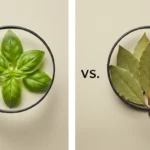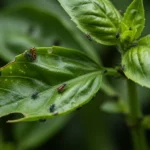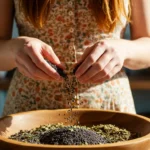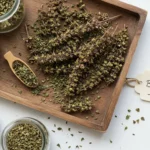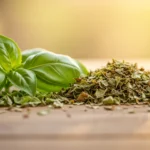For eight years, my garden has been my classroom, and one summer, I learned a powerful lesson from a rather grumpy-looking basil plant. It refused to thrive, no matter what I tried, until I stumbled upon a simple, organic method—a revelation that completely changed how I approached nurturing my herbs. That experience taught me so much about how to fertilize basil naturally, and I’m excited to share those secrets with you.
Okay, let’s talk basil. Not just any basil, but the kind that bursts with flavor and thrives in your garden. I’ve always been a huge fan of growing my herbs, and basil is definitely one of my favorites. But like any living thing, it needs the right nourishment to flourish. That’s where organic basil fertilization comes in.
I’ve learned a lot over the years about natural ways to feed basil, and I’m excited to share my knowledge with you.
Understanding Basil’s Nutrient Needs
Why Natural Fertilization is Best for Basil
Why go natural? Well, for starters, it’s just better for the plant. Chemical fertilizers can give basil a quick boost, but they often lack the micronutrients that are vital for long-term health. Plus, they can throw off the delicate balance of your soil.
How to nourish basil organically is about creating a thriving ecosystem where the plant can access the nutrients it needs, when it needs them. It’s about building healthy soil that supports healthy plants, and that’s something I’m really passionate about.
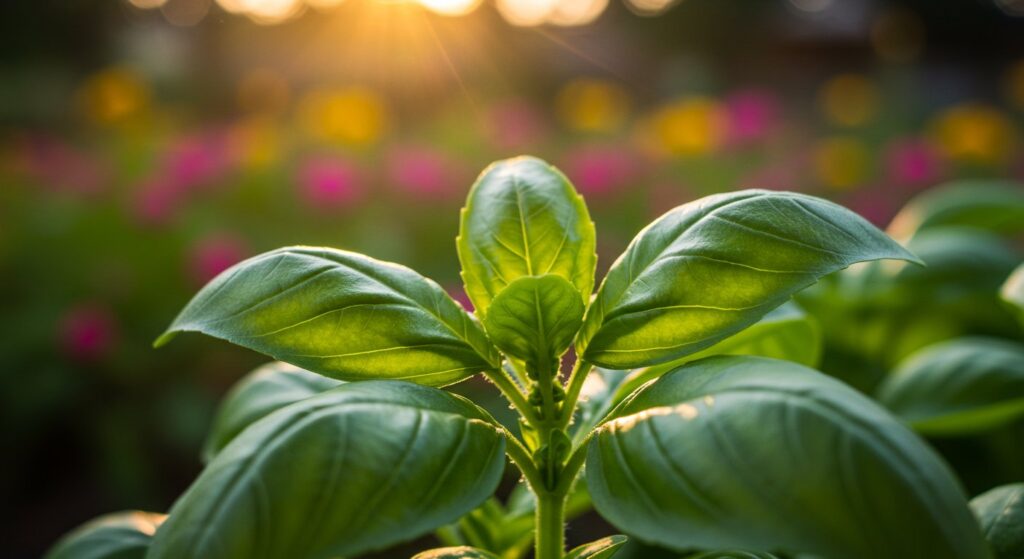
Key Nutrients Basil Requires for Healthy Growth
Basil, like all plants, has its favorite foods. It needs nitrogen for lush, green leaves, phosphorus for strong roots, and potassium for overall health and disease resistance. These are the big three, but it also craves micronutrients like calcium, magnesium, and iron.
Think of it like a balanced diet for us humans – we need more than just protein, carbs, and fats. Natural nutrients for basil provide this full spectrum of nourishment.
Recognizing Signs of Nutrient Deficiency in Basil
It’s like basil is trying to tell you something when it’s not getting what it needs. Yellowing leaves, especially the older ones, can mean a lack of nitrogen. Slow growth could point to a phosphorus deficiency.
If you see weak stems or a lack of vigor, it might be a potassium issue. Learning to read these signs is key to providing the right care. It’s like being a plant detective, and once you get the hang of it, you’ll be able to pinpoint exactly what your basil needs.
Best Natural Fertilizers for Basil
Composting: The Foundation of Organic Basil Fertilization
Composting is, without a doubt, my favorite way to feed my garden. It’s like turning trash into treasure. By breaking down kitchen scraps, yard waste, and other organic materials, you create a nutrient-rich, dark, crumbly substance that your basil will absolutely love.
Composting for basil isn’t just about fertilizing; it’s about improving soil structure and drainage, creating the perfect environment for your basil to thrive.
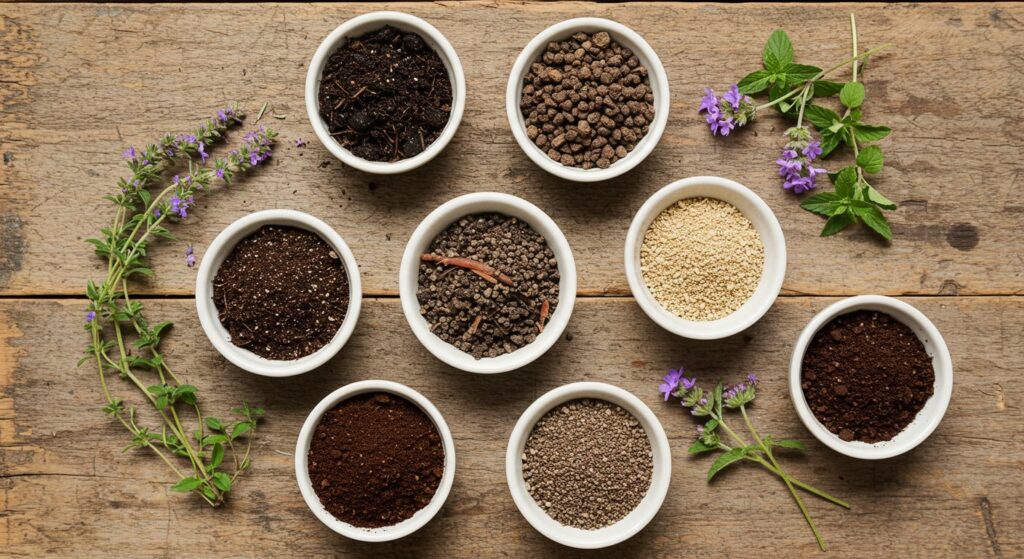
Worm Castings: A Gentle and Effective Natural Nutrient Boost
Worm castings are basically worm poop, and let me tell you, it’s gold for your garden. They’re packed with beneficial microbes and nutrients that are readily available to plants. They’re gentle, so you don’t have to worry about burning your basil, and they’re incredibly effective at boosting growth and overall health.
I often mix them into the soil at planting time or use them as a top dressing.
Aged Manure: A Rich Source of Slow-Release Nutrients
Aged manure is another excellent option for organic plant food for basil. It’s a slow-release fertilizer, meaning it provides nutrients over time as it breaks down. This is great for consistent growth and avoiding nutrient spikes.
Just make sure it’s well-aged, as fresh manure can be too strong and burn your plants. I like to add it to my compost pile or work it into the soil before planting.
Bone Meal: Providing Phosphorus for Strong Roots
Bone meal is a fantastic source of phosphorus, which is essential for strong root development. It’s especially useful when you’re transplanting basil or starting it from seed. The phosphorus helps the roots establish quickly and efficiently, leading to a healthier, more robust plant.
I usually mix a bit into the planting hole or sprinkle it around the base of the plant.
Fish Emulsion: A Quick-Acting Liquid Fertilizer
Fish emulsion is a liquid fertilizer made from fish byproducts. It’s a quick-acting source of nitrogen, so it’s great for giving basil a boost when it needs it. It does have a distinct smell, but the results are worth it.
I typically dilute it in water and use it to water my basil plants, especially when they’re looking a bit pale or slow-growing.
Seaweed Extract: Enhancing Overall Plant Health
Seaweed extract is a powerhouse of micronutrients and growth hormones. It’s not a primary fertilizer, but it enhances overall plant health, improves disease resistance, and helps basil better absorb other nutrients.
I like to use it as a foliar spray, meaning I spray it directly onto the leaves, or I’ll add it to my watering can.
Coffee Grounds: A Nitrogen Boost & Soil Amendment
Used coffee grounds are a great way to add nitrogen to the soil and improve its structure. They’re slightly acidic, which basil loves, and they also help repel some pests. I just sprinkle them around the base of my basil plants or mix them into the soil.
It’s a great way to recycle and give your basil a little boost.
Eggshells: Adding Calcium to the Soil
Eggshells are a fantastic source of calcium, which is important for strong cell walls and overall plant health. I save my eggshells, let them dry, and then crush them into small pieces.
I add them to my compost or sprinkle them around the base of my basil plants. It’s a simple way to add a little extra goodness to the soil. You can learn more about if eggshells are good for basil.
Methods for Applying Natural Basil Fertilizers
Top Dressing: How to Apply Solid Fertilizers
Top dressing is exactly what it sounds like – applying solid fertilizers to the top of the soil. This is a great way to slowly release nutrients over time. I typically use compost, worm castings, or aged manure for this method.
I just spread a layer around the base of the plant, and then water it in.
Liquid Feeding: Using Natural Fertilizer Teas
Liquid feeding is a great way to deliver nutrients directly to the roots. I like to make fertilizer teas using compost, worm castings, or fish emulsion. I simply steep the fertilizer in water for a day or two, then strain it and use the liquid to water my basil plants.
It’s a quick and easy way to give them a boost.
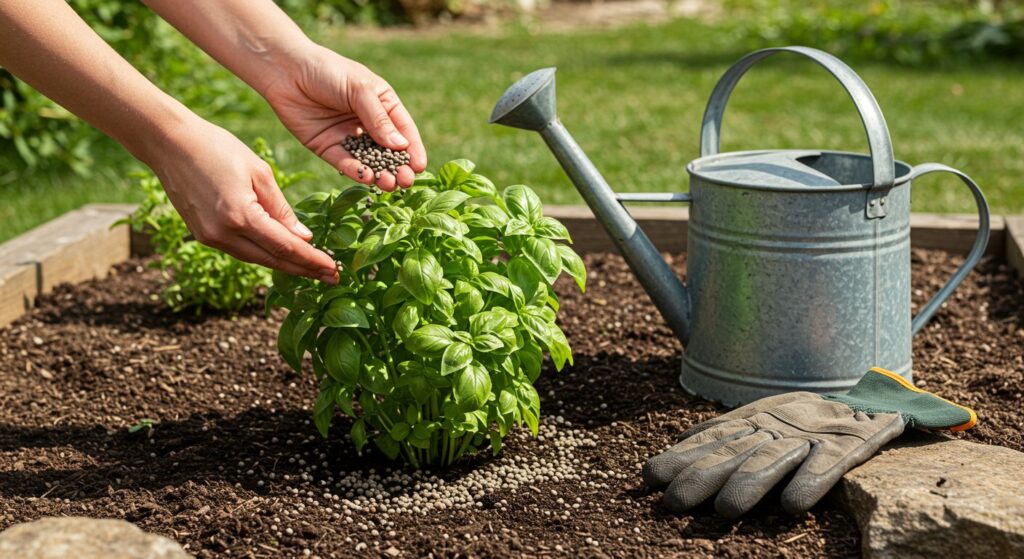
Incorporating Amendments Directly into the Soil
When I’m planting new basil or amending the soil, I like to incorporate fertilizers directly into the soil. This ensures that the nutrients are available right where the roots need them. I typically mix in compost, aged manure, bone meal, and worm castings before planting.
How to Make Homemade Basil Plant Food
Making your homemade basil plant food is easier than you might think. One of my favorite recipes is a compost tea. I take a handful of well-aged compost, put it in a bucket, and fill it with water. I let it sit for a day or two, stirring occasionally, then strain it and use the liquid to water my basil.
It’s a simple and effective way to give them a nutrient boost.
How Often to Fertilize Basil Naturally
Fertilizing Basil at Planting Time
At planting time, it’s crucial to give your basil a good start. I always mix compost, worm castings, and a bit of bone meal into the planting hole. This provides a good foundation of nutrients and helps the roots establish quickly.
It’s like giving them a welcome home meal.
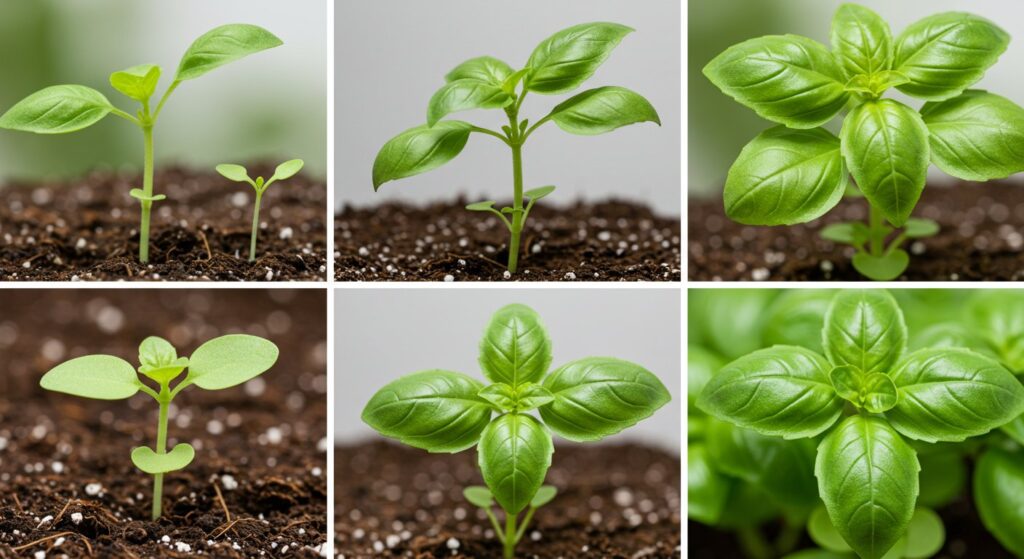
Regular Feeding Schedule for Optimal Growth
For optimal growth, I like to fertilize my basil every 2-4 weeks during the growing season. I use a combination of top dressing and liquid feeding. I might top dress with compost or worm castings one week, and then use a fish emulsion tea the next.
It’s all about keeping a steady supply of nutrients available.
Adjusting Fertilization Based on Basil’s Growth Stage
As basil grows, its nutrient needs change. When it’s young, it needs more nitrogen for leafy growth. As it matures, it needs more phosphorus for root development and potassium for overall health.
I adjust my fertilization schedule accordingly. It’s like tailoring a diet to a person’s age and activity level.
Avoiding Over-Fertilization: Signs to Watch For
Over-fertilizing can be just as bad as under-fertilizing. If you see burnt leaf tips, excessive leaf growth, or a build-up of salts on the soil surface, it’s a sign you’re overdoing it. It’s important to observe your plants and adjust your fertilization schedule as needed.
It’s all about finding that sweet spot.
Natural Soil Enrichment for Basil Plants
Improving Soil Drainage Naturally
Basil hates soggy soil. To improve drainage, I add lots of organic matter like compost, perlite, or even coarse sand. This helps to create air pockets in the soil, allowing water to drain freely.
Good drainage is essential for healthy root development and preventing root rot.
Enhancing Soil Structure with Organic Matter
Organic matter is the key to healthy soil. It improves soil structure, water retention, and nutrient availability. I regularly amend my soil with compost, aged manure, and other organic materials.
This creates a thriving environment for my basil.
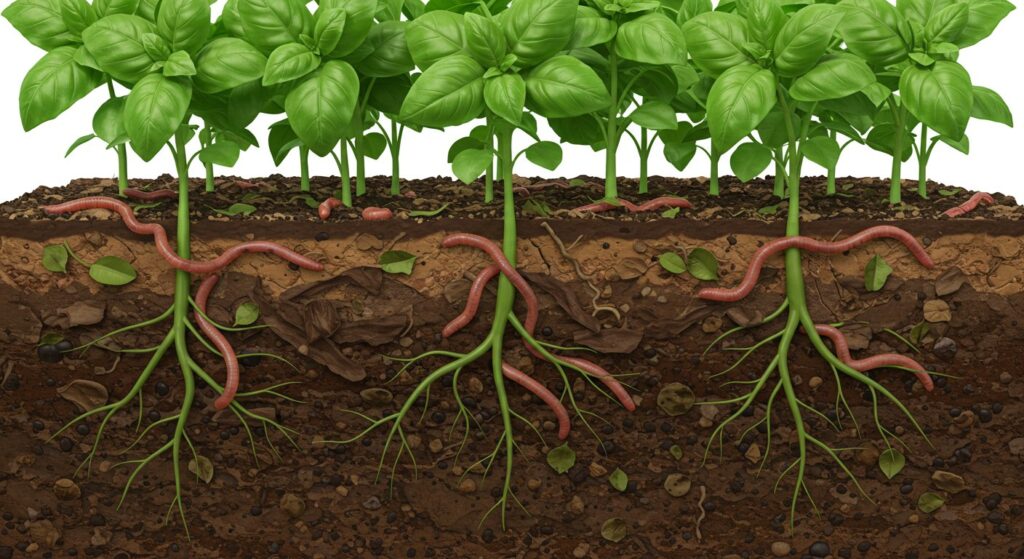
Using Natural Soil Amendments for Basil
Besides compost and manure, there are other natural soil amendments for basil that can be beneficial. Peat moss, coconut coir, and leaf mold are all great options for improving soil structure and water retention. I like to use a combination of these to create the perfect growing medium.
How to Improve Basil Soil Naturally
Improving basil soil naturally is about creating a balanced ecosystem where the plant can thrive. It’s about adding organic matter, improving drainage, and providing the right nutrients. It’s a long-term approach that pays off in the end with healthy, vibrant basil plants.
Troubleshooting Common Basil Problems with Natural Fertilization
Yellowing Leaves: Addressing Nitrogen Deficiency
Yellowing leaves are often a sign of nitrogen deficiency. To address this, I use nitrogen-rich fertilizers like fish emulsion, coffee grounds, or compost tea. I also make sure to provide enough water and sunlight, as these factors can also contribute to yellowing leaves.
Slow Growth: Boosting Nutrient Uptake Naturally
Slow growth can be a sign that your basil isn’t getting enough nutrients. To boost nutrient uptake, I use a combination of compost, worm castings, and seaweed extract. I also make sure the soil is well-drained and that the plant is getting enough sunlight.
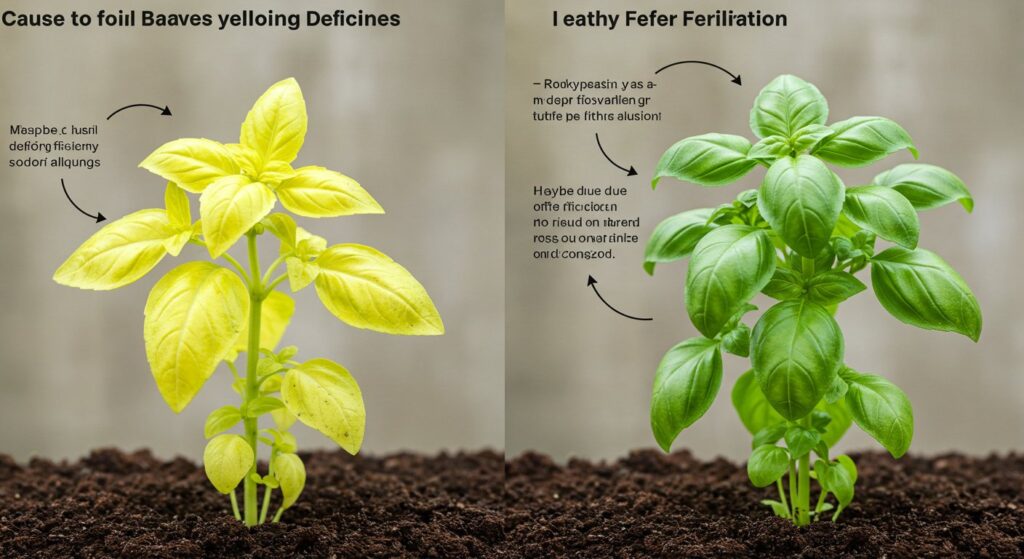
Weak Stems: Strengthening Basil with Proper Nutrients
Weak stems can be a sign of a potassium deficiency. To strengthen basil, I use potassium-rich fertilizers like wood ash or compost. I also make sure the plant is getting enough sunlight and that the soil is well-drained.
Natural Ways to Feed Basil for Optimal Health
Natural ways to feed basil for optimal health involve a holistic approach. It’s not just about providing the right nutrients, but also about creating a healthy environment for the plant to thrive. This includes providing plenty of sunlight, good drainage, and regular watering.
Sustainable Basil Fertilization Methods
Eco-Friendly Basil Fertilizer Practices
Eco-friendly basil fertilizer practices are all about minimizing our impact on the environment. This includes using organic fertilizers, composting, and avoiding the use of chemical fertilizers and pesticides. It’s about working with nature, not against it.
Composting for Basil: A Closed-Loop System
Composting is a great way to create a closed-loop system in your garden. By composting kitchen scraps and yard waste, you create nutrient-rich fertilizer for your basil, reducing waste and minimizing your environmental footprint.
Chemical-Free Basil Fertilization: Protecting Your Garden
Chemical-free basil fertilization is about protecting your garden and the environment from harmful chemicals. By using natural fertilizers, you can create a healthy and sustainable garden that’s safe for you, your family, and the planet.
Organic Basil Fertilization: A Long-Term Approach
Organic basil fertilization is a long-term approach to gardening. It’s about building healthy soil that supports healthy plants, and it’s about working with nature to create a sustainable and thriving garden.
Natural Basil Growth Enhancers
How to Organically Boost Basil Growth
How to organically boost basil growth involves providing the right nutrients, sunlight, and water. It also involves creating a healthy soil environment that supports strong root development and overall plant health. It’s about working with nature, not against it.
Natural Nutrients for Basil
Natural nutrients for basil are the key to healthy growth and vibrant flavor. These include nitrogen, phosphorus, potassium, and a variety of micronutrients. By using organic fertilizers, you can provide your basil with all the nutrients it needs to thrive.
Best Natural Basil Plant Care
The best natural basil plant care involves a holistic approach that considers all aspects of the plant’s needs. This includes providing the right nutrients, sunlight, water, and soil conditions. It’s about creating a thriving environment where the plant can reach its full potential.
Feeding Basil with Organic Matter
Feeding basil with organic matter is the foundation of organic gardening. Organic matter improves soil structure, water retention, and nutrient availability. It’s the key to creating a healthy and thriving garden.
Natural Basil Fertilizer Recipes
Homemade Basil Plant Food Recipes
I have a few favorite homemade basil plant food recipes. One is a simple compost tea, as I mentioned before. Another is a fish emulsion tea, diluted in water. I also like to make a simple mixture of worm castings and bone meal, which I use as a top dressing.
Best Natural Fertilizer for Basil Recipes
The best natural fertilizer for basil recipes are those that provide a balanced blend of nutrients. I like to use a combination of compost, worm castings, aged manure, bone meal, and fish emulsion. This provides a good mix of slow-release and quick-acting nutrients.
Natural Basil Fertilizer Recipes
Experimenting with different natural basil fertilizer recipes is part of the fun of organic gardening. Don’t be afraid to try new things and see what works best for your garden. The key is to observe your plants and adjust your approach as needed.
